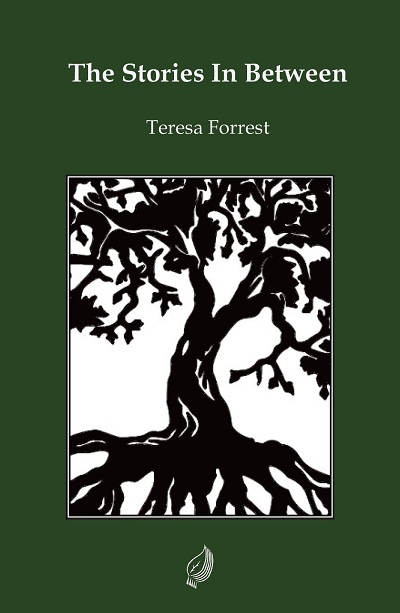Categories

The Stories In Between
ISBN: 9781915434111
Format: Pamphlet, 40 pages,
Available (Published: December 2023)
£7.00
Book details
Teresa Forrest’s debut pamphlet, The Stories in Between, explores heritage, relationships and what it means to belong. Poems about family members are rooted, as are the people themselves, in the landscape around them. But there are also lonely people wandering across the pages, asking to be listened to. And there are glimpses into other people’s lives, showing us how they have been dislocated, and how profound loss has shaped some of them. What is left unspoken, the stories in between the poems, is as important as the message conveyed.
About the Author
Teresa Forrest is originally from a small town in Northern Ireland and has a degree in Sociology from Queen’s University, Belfast. She now lives in Nottinghamshire and is Secretary of Nottingham Poetry Society. Teresa’s writing is informed by the interpersonal connections between people, or what it means to be placed outside of that. Her poems have appeared in a variety of magazines including Iota, The Interpreter’s House, South and The North.
1 review for The Stories In Between
You must be logged in to post a review.



Five Leaves Publishing –
There are twenty-five short poems in this pamphlet; the longest is twenty-four lines. They are written in deceptively simple language, deceptive because, despite their accessibility, the poems, rooted in real people and the landscape around them, are profound and deeply moving. They reward the reader who pays close attention.
In the first poem, ‘Almost Home’, a mother addresses her child:
I, your mother, am formed from folklore,
spit and cabbage. When I made you,
I hadn’t finished making me. I am so rough
around the edges.
The shortest poem and one of my favourites (it is impossible to choose just one) is ‘In Balerin Village.’ The first two lines focus on a domestic appliance: ‘The fat-bellied range in my granny’s house’ which ‘works hard / to warm us.’ But the description of the range is also suggestive of the character of its owner, ‘Get too close and it warns us with a scalding tongue.’
The poetic skill here is subtle – the rhyming of warm and warn, the connection between scalding and scolding. There is humour too: ‘Pans hiss with home grown / and, once, a cockerel that had crowed too early for her liking.’ The reader can be in no doubt that this grandmother is a strong and energetic character, summarized in the fifth line of this short poem which stays with the domestic imagery: ‘Always the kettle whistles to her tune.’ But the poem is not confined to the kitchen and the grandmother cannot be contained within its lines, the final two of which expand horizons, speaking volumes about the tender relationship between the narrator and her grandmother and hinting at the stories in between:
Each morning she gives me an orange,
a small globe that feels like the world.
There are other stories. ‘Pillow Talk’ charts the gradual disintegration of a couple’s relationship from ‘that first moment / of easy laughter, / pillow talk between kisses.’ There’s the woman who lives ‘on the Tenth Floor of the High Rise’ who has ‘painted her room the colours of the sun.’ There’s ‘Mrs Ritchie’ who ‘carries her anger in a handbag, / worn-out crocodile skin, used to have matching shoes.’
The narrative voice remains consistent throughout the collection, compassionate, observant, respectful and with an Irish lilt. This pamphlet is a slim masterpiece.
Julie Gardner